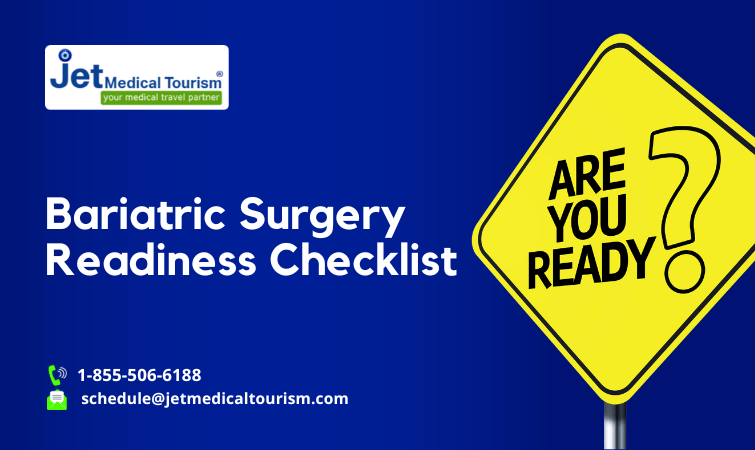Weight Gain After Gastric Sleeve: What To Do?
Gastric sleeve surgery has become a popular weight loss procedure due to its effectiveness in promoting significant and sustainable weight loss. However, some individuals may experience weight regain after the initial weight loss period, which can be frustrating and concerning. At Jet Medical Tourism, we understand the challenges that patients may face after undergoing this life-changing surgery, and we’re here to provide guidance and support every step of the way.
In this blog we will be sharing the common causes of weight gain after gastric sleeve procedure and discuss strategies to reverse the same.
Weight Gain After Gastric Sleeve Surgery
Undergoing gastric sleeve surgery is a significant step towards achieving sustainable weight loss and improving overall health. However, some patients may experience weight regain after the initial weight loss period. Understanding the potential causes is crucial to address this issue promptly.
Is Weight Gain Common after Weight Loss Surgery?
While gastric sleeve surgery is an effective tool for promoting significant weight loss, weight regain is not uncommon. As per PubMed, approximately 20-30% of patients may experience weight regain within two to three years after surgery. However, the extent of weight regain can vary considerably among individuals.
Causes of Weight Gain after Gastric sleeve
Weight gain after gastric sleeve surgery can be a concerning issue, and understanding its causes is crucial for effective management. Here’s a detailed breakdown of the potential factors contributing to weight gain post-surgery:
1. Non-adherence to Dietary Recommendations
Following a strict dietary regimen post-gastric sleeve surgery is paramount for successful weight loss and maintenance. However, deviating from the prescribed diet plan by indulging in high-calorie foods, frequent snacking, or increasing portion sizes can sabotage weight loss efforts. Patients may underestimate the importance of dietary adherence or struggle with emotional eating, leading to overconsumption and subsequent weight regain.
2. Lack of Physical Activity
Adequate physical activity is essential for sustaining weight loss and promoting overall health. However, a sedentary lifestyle or inadequate exercise regimen can impede weight management efforts. Reduced physical activity levels may result from various factors such as mobility issues, lack of motivation, or time constraints. Insufficient exercise can hinder calorie expenditure, slow down metabolism, and contribute to weight regain over time.
3. Emotional Hunger
Emotional eating, characterized by consuming food in response to emotional triggers rather than physiological hunger, is a significant contributor to weight regain post-weight loss surgery. Psychological factors such as stress, anxiety, depression, and poor coping mechanisms can lead to emotional eating behaviors. Research highlights the association between emotional eating and weight regain after bariatric surgery. Addressing underlying emotional issues through counseling, therapy, and behavioral interventions is essential for preventing and managing weight regain in patients undergoing weight loss surgery.
4. Hormonal Imbalances
Gastric sleeve surgery alters the gastrointestinal tract and can affect hormone levels involved in appetite regulation, such as leptin and ghrelin. While the surgery initially suppresses appetite and promotes weight loss, hormonal changes may occur over time, potentially leading to increased hunger and reduced satiety. Hormonal imbalances can trigger cravings, emotional eating, and overeating, contributing to weight regain despite surgical intervention.
5. Metabolic Adaptation
The body has a remarkable ability to adapt to changes in calorie intake and expenditure. Following gastric sleeve surgery, the significant reduction in stomach capacity and altered digestive processes initially promote rapid weight loss. However, over time, metabolic adaptation may occur as the body adjusts to the lower calorie intake. Metabolic rate may decrease, and energy expenditure may diminish, making it challenging to sustain weight loss and prevent regain.
6. Genetic Predisposition
Genetics play a significant role in determining an individual’s susceptibility to weight gain and their response to weight loss interventions, including bariatric surgery. Some individuals may have genetic predispositions that make them more prone to weight regain despite adhering to post-operative guidelines. Genetic factors influencing metabolism, appetite regulation, and fat storage can impact weight management outcomes following gastric sleeve surgery.
7. Surgical and Anatomical Factors
Certain surgical and anatomical factors associated with weight loss surgery can influence long-term outcomes, including weight regain. Complications such as pouch dilation, gastroesophageal reflux, and stoma outlet obstruction may occur following gastric sleeve surgery, affecting the effectiveness of weight loss and maintenance. Anatomical changes in the gastrointestinal tract, such as the adaptation of the remaining stomach tissue and alterations in gut hormone secretion, can impact appetite regulation and energy metabolism post-surgery.
Psychological Factors Contributing to Weight Gain After Gastric Sleeve Surgery
Psychological factors play a significant role in weight management after bariatric surgery. Emotional eating, stress, and underlying mental health conditions like depression or anxiety can contribute to unhealthy eating habits and weight regain. Addressing these psychological factors through counseling, support groups, or therapy can be instrumental in maintaining long-term weight loss success.
READ: Bariatric Surgery Psychological Evaluation: An Ultimate Guide
How to Reverse Weight Gain after Gastric Sleeve?
To effectively reverse weight gain after gastric sleeve surgery, it’s crucial to approach it with a comprehensive strategy that addresses both physical and psychological factors. Here’s a detailed guide on how to tackle each aspect:
Revisit Your Diet:
- Consult a Dietitian: Schedule an appointment with a registered dietitian experienced in bariatric nutrition. They can assess your current eating habits, identify areas for improvement, and create a personalized meal plan tailored to your needs.
- Focus on Nutrient-Dense Foods: Emphasize whole, nutrient-dense foods such as lean proteins, fruits, vegetables, and whole grains. These foods provide essential vitamins, minerals, and fiber while keeping calorie intake in check.
- Mindful Eating: Practice mindful eating techniques such as chewing slowly, savoring each bite, and paying attention to hunger and fullness cues. This can help prevent overeating and promote better digestion.
- Portion Control: Use measuring tools or visual cues to control portion sizes. Avoid mindlessly eating from large containers or packages, as this can lead to consuming more calories than intended.
- Stay Hydrated: Drink plenty of water throughout the day to stay hydrated and support optimal digestion. Sometimes, thirst can be mistaken for hunger, leading to unnecessary snacking.
- Limit Liquid Calories: Be cautious of liquid calories from sugary beverages, fruit juices, and alcohol. These beverages can contribute to weight gain without providing the same level of satiety as solid foods.
Increase Physical Activity:
- Set Realistic Goals: Start by setting achievable fitness goals based on your current fitness level and health status. Gradually increase the intensity and duration of your workouts as your strength and endurance improve.
- Exercise: Incorporate aerobic activities such as walking, cycling, swimming, or dancing into your routine to burn calories and improve cardiovascular health.
- Strength Training: Include resistance exercises targeting major muscle groups to build lean muscle mass and boost metabolism. This can help enhance overall body composition and increase calorie expenditure even at rest.
- Stay Consistent: Aim for at least 150 minutes of moderate-intensity aerobic exercise or 75 minutes of vigorous-intensity exercise per week, as recommended by health guidelines. Consistency is key to seeing long-term results.
Address Psychological Factors:
- Seek Professional Help: If you struggle with emotional eating, stress, anxiety, or other psychological factors contributing to weight regain, consider seeking support from a therapist or counselor. Cognitive-behavioral therapy (CBT) and other therapeutic techniques can help you develop healthier coping mechanisms and improve your relationship with food.
- Mind-Body Practices: Practice stress-reduction techniques such as mindfulness meditation, yoga, deep breathing exercises, or progressive muscle relaxation to promote relaxation and emotional well-being.
- Identify Triggers: Keep a food diary to track your eating patterns and identify triggers for overeating. Once you recognize specific triggers, develop strategies to address them proactively, such as finding alternative coping mechanisms or avoiding triggering environments.
Attend Support Groups:
- Join Bariatric Support Groups: Connect with other individuals who have undergone gastric sleeve surgery by joining local or online bariatric support groups. These communities provide a platform for sharing experiences, receiving encouragement, and learning from others’ successes and challenges.
- Stay Accountable: Regularly attend support group meetings or participate in online forums to stay accountable to your weight loss goals. Share your progress, setbacks, and strategies with fellow members, and offer support and encouragement to others facing similar struggles.
Consider Medical Interventions:
- Consult Your Healthcare Provider: Discuss any concerns about weight regain with your healthcare provider, who can evaluate your overall health and recommend appropriate interventions.
- Medications or Supplements: In some cases, your healthcare provider may prescribe medications or supplements to help manage hunger, cravings, or metabolic issues associated with weight regain. These interventions should be used in conjunction with lifestyle modifications and under medical supervision.
By implementing these strategies and addressing the underlying factors contributing to weight regain after gastric sleeve surgery, you can effectively reverse the trend and achieve sustainable long-term weight loss success. Remember that consistency, patience, and perseverance are key to overcoming challenges and reaching your health and wellness goals.
Consider Gastric Sleeve Revision
If significant weight regain persists despite lifestyle modifications and medical interventions, your healthcare provider may recommend a gastric sleeve revision. This surgical procedure can further restrict the size of the stomach pouch or address any anatomical issues that may be contributing to weight regain.
It’s important to remember that weight regain after gastric sleeve surgery is not uncommon and can be addressed with the right strategies and support. By working closely with your healthcare team and consistently adhering to a healthy lifestyle, you can regain control and maintain your weight loss success.
Conclusion
Weight regain after gastric sleeve surgery can be a frustrating setback, but it’s a hurdle that can be overcome with the proper approach and assistance. At Jet Medical Tourism, we are committed to equipping our patients with the knowledge, tools, and support necessary to sustain their weight loss journey’s success. Our skilled team of healthcare professionals offers personalized counseling, nutritional guidance, and medical interventions to help you regain control and accomplish your desired outcomes. We understand the challenges you may face and are here to empower you every step of the way.
Weight Regain After Gastric Sleeve? Get Back on Track with Jet Medical Tourism
If you’re struggling with weight regain after gastric sleeve surgery or have any concerns about your weight loss journey, don’t hesitate to reach out to us. Our team at Jet Medical Tourism is here to support you every step of the way. Contact us today to schedule a consultation



